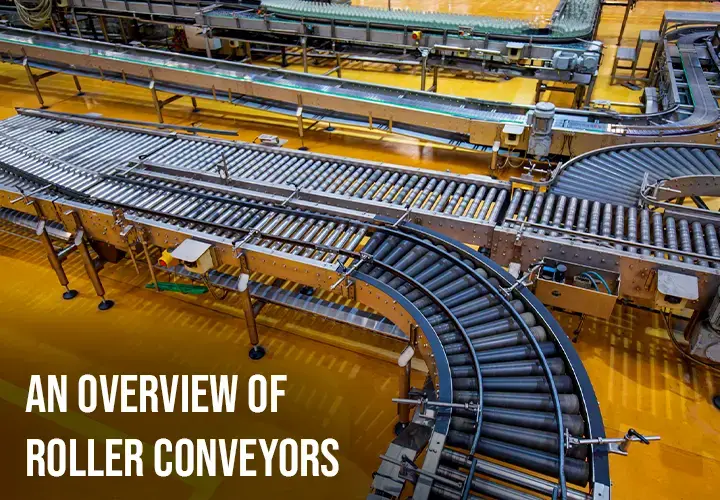
Moving large quantities of materials from A to B is a laborious task. It takes time, effort, manpower and in some cases, it could be very expensive.
So, what’s the solution to this logistical nightmare?
In a word, Roller Conveyors. These are nifty machines that help us transport materials for long distances. The most important facet of owning a roller conveyor is that it helps you transport all types of materials from boxes, supplies, objects and even people (airport standing escalators) in a multitude of ways from upper level to lower or in a horizontal format from one point to the next.
Before proceeding with roller conveyors, take a look at the guide on selecting the right conveyor system.
Construction of a Conveyor Belt
Based on the type of roller conveyor, the setup varies for example – the driver roller has a different setup from a line shaft roller conveyor. To simplify, a roller attached to a motor with a chain and connected to a belt and shaft are the foundational components of a drive roller. The setup helps the roller become bi-directional movement and carry objects from one level to the next.
Basic components present are as follows:
Rollers
Designed to be adapted and adopted for different modes of movements and purposes, they are the most crucial component of the conveyor. The material and type can vary according to the type of industrial use it is to be used for. And most rollers usually follow the same design aesthetic and characteristics. Traction helps control the movement of rollers and it is belts of various sizes, plastic spools, friction belts and chains arranged in particular order.
Type of rollers for industrial purpose include:
- Plastic Roller
- Rollers coated with Rubber
- Stainless Steel Roller
- Nylon Roller
For conveyor belt manufacturers employing different rollers is dependent on the customer’s requirements. Do they have light loads and want a quiet factory, plastic rollers are the best fit.
If they are looking for longevity and durability, Nylon rollers are best. If they work with chemicals and need a really good grip, rubber rollers are a good choice for chemical resistance and anti-static properties. Moving heavy materials in the belt, stainless steel is durable and will last a lifetime. Furthermore, please note that the core of most rollers uses stainless steel materials for their industry-grade strength and smoothness.
24v DC Motors
The construction of the roller conveyor is such that during a production process in the warehouse the materials on the conveyor are to be moved in a slow and orderly manner. Motorised roller controller is the central part of the conveyor setup, it is divided into particular sections.
Each section has a motor driven roller(MDR) and are connected to the main section to enable conveyor movement. Employing a small low powered battery helps use less energy and provides the right amount of torque to move items placed on the belt.
Frames
These frames are crafted from steel, stainless steel, or aluminium. They are versatile and perfect for an assembly line setup.
Support legs
Unsung heroes of the conveyor world. Made in various sizes, materials, and styles. From tripod designs to the iconic “H” shape, they’re the backbone (pun intended) of conveyor stability, accommodating loads with grace and poise.
Ball Bearings
With their angled embrace of loads and precision handling, they’re crucial to conveyor technology, making every move count.
Roller conveyor curves
They keep materials flowing smoothly, no matter the direction.
Applications
Roller conveyors find their applications across diverse industries. In manufacturing, they streamline assembly lines, facilitating the smooth movement of components. Warehousing benefits from roller conveyors for efficient order fulfilment, seamlessly transporting goods from shelves to shipping docks. In logistics, roller conveyors ensure the swift and reliable transportation of baggage and freight, enhancing overall efficiency. Additionally, roller conveyors play a crucial role in food processing, ensuring the safe and hygienic handling of various food products throughout the production process.
Check it out: To know more about Roller Chain Manufacturers in India
Advantages
Also, Read out: Advantages of Conveyor System
The advantages of roller conveyors are manifold.
Firstly, they enhance efficiency by maintaining a continuous flow of materials, reducing downtime and maximising productivity.
Secondly, roller conveyors offer versatility, capable of handling a wide range of materials, shapes, and sizes, making them adaptable to various applications.
Moreover, roller conveyors prove to be cost-effective solutions, as they require minimal maintenance and lower labor costs compared to traditional material handling methods.
Lastly, roller conveyors prioritize safety, incorporating built-in features to ensure the protection of workers and the smooth operation of the system, thus fostering a secure working environment.
Opt for Delta
Ready to roll into efficiency and convenience? Look no further than Delta!
With over a decade of expertise, Delta offers top-notch roller conveyors that are as durable as they are reliable.
Say goodbye to bottlenecks and hello to seamless material handling with our innovative solutions. Whether you’re in manufacturing, warehousing, logistics, or food processing, Delta has the perfect conveyor to suit your needs.
Don’t miss out on the chance to elevate your operations with our high-quality products. Get in touch with Delta Stark Engineering today and let’s roll towards success together!
